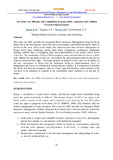| dc.contributor.author | Kanda, Edwin | |
| dc.contributor.author | Taragon, John | |
| dc.contributor.author | Waweru, Samuel | |
| dc.contributor.author | Kimokoti, Susan | |
| dc.date.accessioned | 2018-07-02T05:51:21Z | |
| dc.date.available | 2018-07-02T05:51:21Z | |
| dc.date.issued | 2013-12 | |
| dc.identifier.issn | 1992-2744 | |
| dc.identifier.uri | http://r-library.mmust.ac.ke/123456789/588 | |
| dc.description.abstract | The water Act 2002 provides for Integrated Water Resources Management along the River Basin that is the best practice worldwide and in accordance with Dublin Principles. Prior to reforms in the water sector, water supply and sanitation and water resources management in Kenya faced huge challenges among them being institutional weaknesses, inadequate funding, conflicts due to overlapping roles and responsibilities of key public sectors in the water Act. The constitution of Kenya 2010 recognizes water and sanitation services as a basic right. Before the enactment of the new constitution, the old constitution did not provide for water provision as basic right. This paper presents an analysis of the water Act in relation to the new constitution of Kenya and the challenges facing its implementation. Ways of harmonizing the water Act with the new constitution are explored. It is imperative to note that the Water Act does not recognize water as a basic right and therefore some sections of the Act have to be amended to conform to the constitution which enshrines it in the Bill of Rights. | en_US |
| dc.language.iso | en | en_US |
| dc.publisher | International Journal of Disaster Management and Risk Reduction | en_US |
| dc.subject | Water Act 2002, Constitution of Kenya 2010, water provision and management, coherence and conflicts | en_US |
| dc.title | The Water Act 2002 and The Constitution of Kenya 2010: Coherence and Conflicts Towards Implementation | en_US |
| dc.type | Article | en_US |

